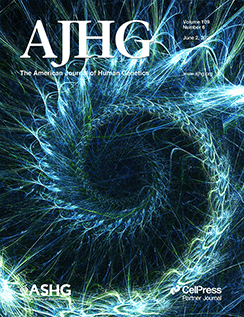Bi-allelic KICS2 mutations impair KICSTOR complex-mediated mTORC1 regulation, causing intellectual disability and epilepsy.
IF 8.1
1区 生物学
Q1 GENETICS & HEREDITY
引用次数: 0
Abstract
Nutrient-dependent mTORC1 regulation upon amino acid deprivation is mediated by the KICSTOR complex, comprising SZT2, KPTN, ITFG2, and KICS2, recruiting GATOR1 to lysosomes. Previously, pathogenic SZT2 and KPTN variants have been associated with autosomal recessive intellectual disability and epileptic encephalopathy. We identified bi-allelic KICS2 variants in eleven affected individuals presenting with intellectual disability and epilepsy. These variants partly affected KICS2 stability, compromised KICSTOR complex formation, and demonstrated a deleterious impact on nutrient-dependent mTORC1 regulation of 4EBP1 and S6K. Phosphoproteome analyses extended these findings to show that KICS2 variants changed the mTORC1 proteome, affecting proteins that function in translation, splicing, and ciliogenesis. Depletion of Kics2 in zebrafish resulted in ciliary dysfunction consistent with a role of mTORC1 in cilia biology. These in vitro and in vivo functional studies confirmed the pathogenicity of identified KICS2 variants. Our genetic and experimental data provide evidence that variants in KICS2 are a factor involved in intellectual disability due to its dysfunction impacting mTORC1 regulation and cilia biology.双等位基因KICS2突变损害KICSTOR复合物介导的mTORC1调节,导致智力残疾和癫痫。
营养依赖性mTORC1对氨基酸剥夺的调节是由KICSTOR复合体介导的,该复合体包括SZT2、KPTN、ITFG2和KICS2,将GATOR1招募到溶酶体中。以前,致病性SZT2和KPTN变异与常染色体隐性智力残疾和癫痫性脑病有关。我们在11名智力残疾和癫痫患者中发现了双等位基因KICS2变异。这些变异部分影响了KICS2的稳定性,破坏了KICSTOR复合物的形成,并对4EBP1和S6K的营养依赖性mTORC1调控产生了有害影响。磷酸化蛋白质组分析扩展了这些发现,表明KICS2变异体改变了mTORC1蛋白质组,影响了翻译、剪接和纤毛发生中的蛋白质。在斑马鱼中,Kics2的缺失导致纤毛功能障碍,这与mTORC1在纤毛生物学中的作用一致。这些体外和体内功能研究证实了已鉴定的KICS2变异的致病性。我们的遗传和实验数据提供了证据,证明KICS2的变异是智力残疾的一个因素,因为它的功能障碍影响mTORC1的调节和纤毛生物学。
本文章由计算机程序翻译,如有差异,请以英文原文为准。
求助全文
约1分钟内获得全文
求助全文
来源期刊
CiteScore
14.70
自引率
4.10%
发文量
185
审稿时长
1 months
期刊介绍:
The American Journal of Human Genetics (AJHG) is a monthly journal published by Cell Press, chosen by The American Society of Human Genetics (ASHG) as its premier publication starting from January 2008. AJHG represents Cell Press's first society-owned journal, and both ASHG and Cell Press anticipate significant synergies between AJHG content and that of other Cell Press titles.

 求助内容:
求助内容: 应助结果提醒方式:
应助结果提醒方式:


